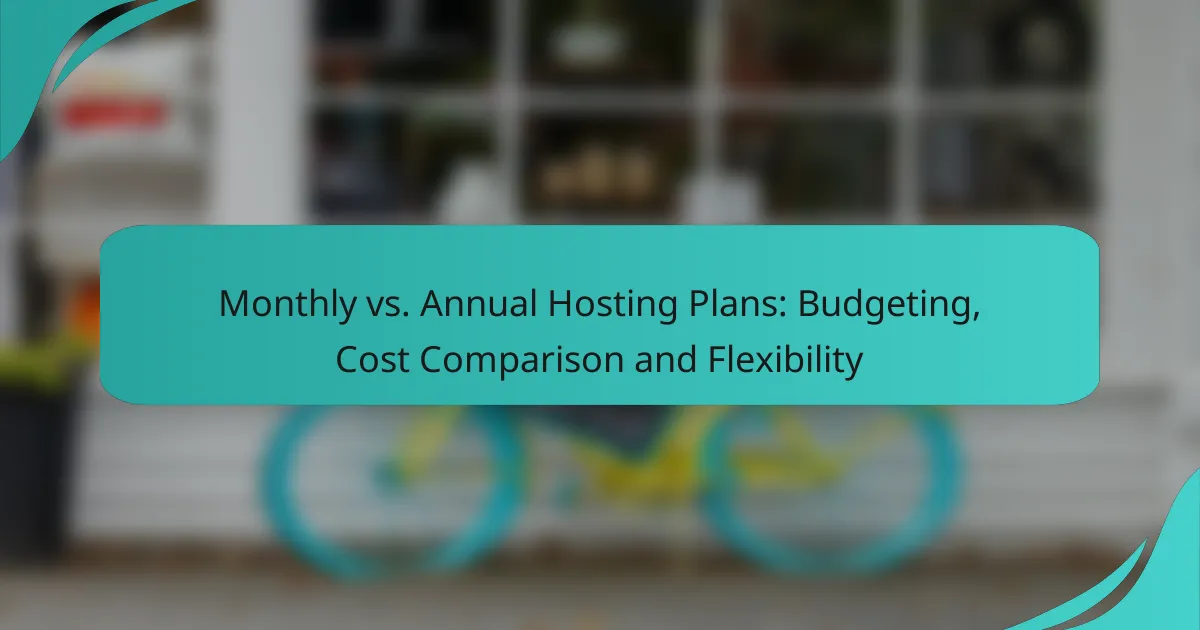Hidden fees in hosting contracts can lead to unexpected financial burdens for small businesses, as they often inflate overall costs beyond initial estimates. These charges frequently stem from undisclosed services or vague pricing structures, making it essential for business owners to carefully scrutinize contract details to avoid budget overruns and cash flow issues.

What are hidden fees in hosting contracts?
Hidden fees in hosting contracts are unexpected charges that can significantly increase the overall cost of a hosting service. These fees often arise from additional services or features that are not clearly disclosed in the initial pricing, impacting a business’s budget and financial planning.
Common types of hidden fees
Hidden fees can take various forms, including setup fees, domain registration costs, and charges for exceeding bandwidth limits. Other common examples are fees for SSL certificates, backups, and customer support beyond a certain threshold.
It’s crucial to read the fine print of hosting contracts to identify these potential costs. Many providers may advertise low monthly rates but include additional charges that can add up quickly, making the total cost much higher than expected.
Examples from Canadian hosting providers
Additionally, certain Canadian hosts may impose fees for early contract termination or for upgrading to a higher tier of service. Being aware of these practices can help small businesses avoid budget overruns and make more informed decisions when selecting a hosting provider.

How do hidden fees impact small business budgets?
Hidden fees can significantly strain small business budgets by inflating overall costs and creating unexpected financial burdens. These fees often go unnoticed during initial contract negotiations, leading to budget overruns and cash flow issues.
Effects on overall hosting costs
Hidden fees can increase the total cost of hosting services by a considerable margin. For instance, a hosting plan advertised at $10 per month might include additional charges for features like backups, SSL certificates, or bandwidth overages, raising the actual monthly expense to $20 or more.
Small businesses should carefully review hosting contracts to identify any potential hidden fees. Comparing plans side-by-side can help reveal which providers offer transparent pricing versus those that may surprise you with extra costs later.
Budgeting for unexpected expenses
To effectively budget for hidden fees, small businesses should allocate a buffer in their financial plans. Setting aside an additional 10-20% of the expected hosting costs can help cover unforeseen charges without disrupting overall cash flow.
Regularly reviewing hosting invoices and tracking expenses can also help identify patterns in hidden fees. This practice allows businesses to adjust their budgets proactively and negotiate better terms with hosting providers when necessary.

What are the signs of hidden fees in hosting contracts?
Signs of hidden fees in hosting contracts often include vague pricing structures, unclear service descriptions, and unexpected charges that appear after signing. It’s crucial to scrutinize the contract details to identify potential costs that may not be immediately apparent.
Red flags to watch for
Be cautious of promotional pricing that significantly increases after the initial term. If a hosting provider advertises a low monthly rate but does not clearly state the renewal price, this could indicate hidden fees. Additionally, watch for terms like “setup fees” or “maintenance charges” that may not be included in the initial quote.
Another red flag is the lack of transparency in the billing process. If the provider does not offer a detailed breakdown of charges or if their customer service is unresponsive to inquiries about costs, it may signal that hidden fees are present.
Contract clauses that indicate hidden fees
Examine the contract for clauses that mention “additional services” or “optional features” that come with extra costs. These can often lead to unexpected charges if you inadvertently select them. Look for language that allows the provider to change pricing or fees without prior notice, which can lead to budget overruns.
Clauses related to early termination fees or cancellation policies can also indicate potential hidden costs. If the contract stipulates high fees for early cancellation, it may suggest that the provider anticipates customers wanting to leave due to dissatisfaction with undisclosed charges.

How to choose a transparent hosting provider in Canada?
To choose a transparent hosting provider in Canada, prioritize those that clearly outline their pricing structures and any potential hidden fees. Look for providers that offer straightforward contracts, detailed service descriptions, and customer-friendly policies.
Criteria for evaluating hosting contracts
When evaluating hosting contracts, focus on key criteria such as pricing clarity, service level agreements (SLAs), and customer support options. Ensure that the contract specifies all costs, including renewal rates, bandwidth overages, and additional features.
Consider the terms of the contract, including the length of commitment and cancellation policies. A flexible contract with a clear exit strategy can save you from unexpected fees if your needs change.
Lastly, read customer reviews and testimonials to gauge the provider’s reputation for transparency and reliability. This can provide insight into any hidden fees that may not be immediately apparent in the contract.
Top Canadian hosting providers with transparent pricing
Some of the top Canadian hosting providers known for their transparent pricing include HostPapa, A2 Hosting, and SiteGround. These companies typically offer clear pricing structures with no hidden fees, making it easier for small businesses to budget effectively.
HostPapa, for instance, provides a straightforward pricing model with no surprise charges for essential features like SSL certificates and domain registration. A2 Hosting also emphasizes transparency, with detailed breakdowns of costs on their website.
When selecting a provider, compare their offerings and pricing plans to find the best fit for your business needs. Look for those that provide clear communication and support to help you navigate any questions about your contract.

What are the legal implications of hidden fees?
Hidden fees in hosting contracts can lead to significant legal implications for both consumers and businesses. These fees may violate consumer protection laws, resulting in disputes that can affect a company’s reputation and finances.
Consumer protection laws in Canada
In Canada, consumer protection laws require businesses to disclose all fees associated with their services clearly. The Competition Act mandates that misleading representations, including hidden fees, are prohibited, allowing consumers to seek remedies if they are misled.
Provincial laws, such as the Consumer Protection Act in Ontario, further reinforce these requirements, ensuring that consumers have the right to transparent pricing. Businesses that fail to comply may face penalties or legal action from regulatory bodies.
Case studies of legal disputes
Several notable cases in Canada highlight the consequences of hidden fees in hosting contracts. In one instance, a web hosting company was fined for not disclosing additional charges for essential services, leading to a class-action lawsuit from affected customers.
Another case involved a small business that incurred unexpected costs due to undisclosed fees, resulting in financial strain. The court ruled in favor of the business, emphasizing the importance of transparency in pricing and the legal obligations of service providers.

How can small businesses negotiate hosting contracts?
Small businesses can negotiate hosting contracts by understanding their needs and leveraging competitive offers. This approach helps ensure they secure favorable terms and avoid hidden fees that could impact their budget.
Effective negotiation strategies
Start by researching various hosting providers to understand the market rates and services offered. This knowledge empowers you to negotiate better terms based on competitive pricing and features.
Consider bundling services, such as domain registration and SSL certificates, to strengthen your position. Providers may offer discounts for bundled services, making it easier to negotiate a lower overall price.
Always ask about hidden fees and clarify any ambiguous terms. Requesting a detailed breakdown of costs can help identify potential charges that could arise later, allowing you to negotiate those out of the contract.
Key terms to include in contracts
Ensure your contract includes clear definitions of service levels, uptime guarantees, and support response times. This clarity helps set expectations and provides recourse if the provider fails to meet their commitments.
Include clauses that address potential price increases and the conditions under which they may occur. This protects your business from unexpected budget impacts over time.
Finally, specify the terms for contract termination and data ownership. Knowing how to exit the contract and who retains your data can prevent complications if you decide to switch providers in the future.

What are the long-term effects of hidden fees?
Hidden fees in hosting contracts can significantly impact a business’s financial health over time. These unexpected costs can strain budgets, hinder growth, and lead to dissatisfaction with service providers.
Impact on business growth
Hidden fees can stifle business growth by diverting funds away from essential investments. For instance, if a small business allocates a portion of its budget to hosting only to discover additional charges for bandwidth or storage, it may have less capital available for marketing or product development.
Moreover, the unpredictability of these fees can create cash flow issues, making it difficult for businesses to plan for the future. Consistent, unanticipated costs can lead to financial instability, ultimately affecting the ability to scale operations.
Strategies to mitigate financial risks
To reduce the risk of hidden fees, businesses should thoroughly review hosting contracts before signing. Look for clear breakdowns of costs and ensure that all potential charges are disclosed, including those for exceeding usage limits or additional support services.
Regularly monitoring hosting expenses can also help identify any unexpected charges early. Setting a budget that includes a buffer for potential fees can provide a safety net, allowing businesses to manage their finances more effectively.
- Request a detailed list of all fees from the provider.
- Compare multiple hosting options to find transparent pricing.
- Negotiate terms to include caps on variable fees.

What emerging trends affect hosting fees?
Emerging trends in hosting fees focus on increased transparency and technological advancements that can significantly impact costs. Businesses must stay informed about these trends to manage their budgets effectively and avoid unexpected expenses.
Shift towards transparent pricing models
Many hosting providers are moving towards transparent pricing models to build trust with customers. This shift involves clearly outlining all costs associated with hosting services, including potential hidden fees that may arise during the contract period.
For small businesses, understanding these transparent pricing structures is crucial. Look for providers that offer detailed breakdowns of costs, including renewal rates, additional services, and any potential penalties for early termination. This clarity helps in budgeting and prevents surprises down the line.
Technological advancements reducing costs
Technological advancements in cloud computing and virtualization are driving down hosting costs. Providers can now offer more efficient services at lower prices due to improved resource management and scalability.
Small businesses can take advantage of these advancements by opting for cloud-based solutions that typically offer flexible pricing based on usage. This model allows businesses to pay only for the resources they need, which can lead to significant savings compared to traditional hosting plans.










